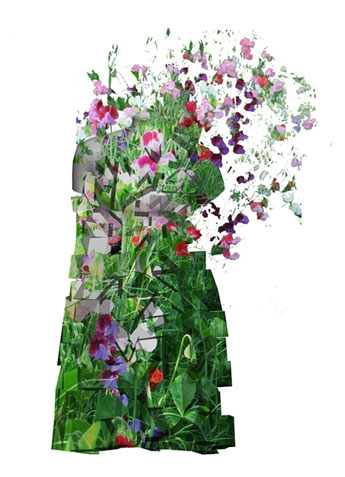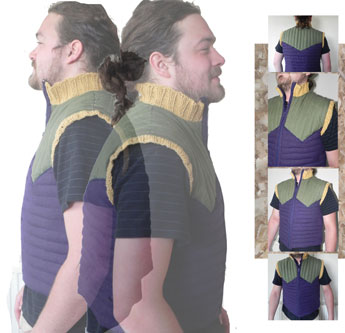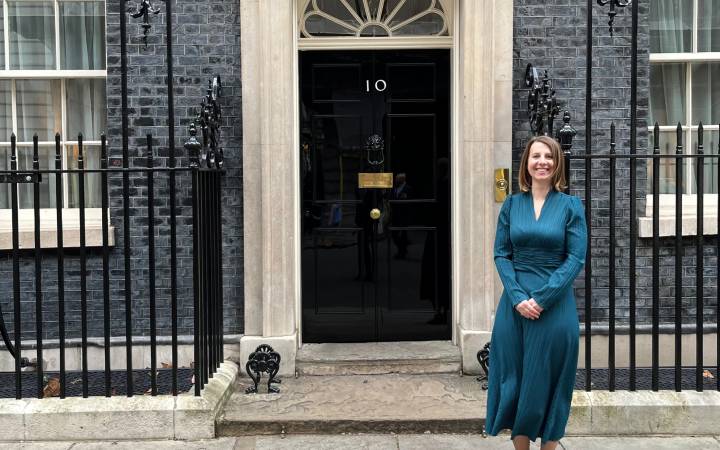Universities collaborate to take low carbon couture to the catwalk
Posted Wednesday 11 September 2013
 Low carbon couture hit the catwalk at an exclusive event organised by Kingston University, showcasing a joint project with the University of East Anglia (UEA).
Low carbon couture hit the catwalk at an exclusive event organised by Kingston University, showcasing a joint project with the University of East Anglia (UEA).
Dresses made from living plants and a jacket padded with wood shavings were among the environmentally-friendly fashion on display as Kingston's young designers unveiled their concepts about the future of the industry and how it could reduce its carbon footprint.
They presented their projects to industry experts and environmentalists as well as the general public at the Kingston University MA Fashion Show on the eve of London Fashion Week.
The UEA-Kingston University collaboration focuses on sustainable luxury. The project, sponsored by InCrops based at UEA's Adapt Low Carbon Group in Norwich, aims to raise awareness among young designers about the environmental impact of their work and encourage them to find ways to use bio-based and renewable materials to create luxury fashion.
This year students were asked to focus on wood. The brief reflected a growing demand for products made from UK-grown timber while also highlighting the value of natural resources and the potential consequences of endangering them. The young designers came up with a range of futuristic fabrics, garments, and designs, including dresses which incorporated living plants to purify the air and panelled coats insulated using waste wood shavings.
Kingston University student Minka Lusse, who recently made the final of London Mayor Boris Johnson's Low Carbon Prize Awards with a quilted jacket, said the InCrops project was very challenging and tackled issues she believed were extremely important.
"I have always been interested in sustainability and the development of our environment. My final product was a winter jacket, filled with wood shavings for insulation. Finding a viable use for this common waste product allows the reduction of carbon emissions created during the manufacture of synthetic hollow fibres. Wood shavings can also be used as a substitute for feathers and downs, which are often sourced unethically through plucking of live poultry."
Kingston University student Bez Baik, meanwhile, focused on adding functionality to clothing and textiles by integrating the purifying power of plants into her designs, fusing fashion and landscaping in dress-flowerbed hybrids.
The student s' focus on extracting value from waste products fitted perfectly with the Adapt Low Carbon Group ethos of carbon reduction through resource efficiency, Liliya Serazetdinova from InCrops said.
s' focus on extracting value from waste products fitted perfectly with the Adapt Low Carbon Group ethos of carbon reduction through resource efficiency, Liliya Serazetdinova from InCrops said.
"The show represented the culmination of another successful year of collaborative work. At InCrops, we nurture collaborations between science and art, as we believe the resulting work is a vital starting point for the next generation of innovative developments in technology."
Designers have the power to reduce the carbon footprint of products through selecting materials with a lower environmental impact and exploring low carbon manufacturing processes, Ms Serazetdinova added.
"Through projects such as the Kingston collaboration, we can showcase highly innovative approaches to lowering our carbon emissions, as well as ingraining a low carbon ethos into the fashion designers of tomorrow who will influence public perception of bio-materials and sustainability."
Kingston University fashion expert Jo Norman said projects such as this helped to cultivate a new breed of designers who could confidently engage with science and technologyl.
"The InCrops project has seen an even broader depth of research integrating both materials and process as the students strived to create ecological and sustainable luxury fashion.
"Cork, wood - from log to shavings - and bamboo had all been used being used as part of this focus on the future of fashion, with Bez Baik's architectural style of design bringing a completely new angle to ecological fashion," Ms Norman added.
"With InCrops' invaluable support, the students have been inspired to incorporate low carbon development as an integral part of their design process. This experience will remain with them throughout their careers."
The Kingston University MA Fashion Show took place on Thursday 12 September at Queen Elizabeth Hall on London's Southbank. It included an exhibition of some of the work produced as part of the InCrops collaboration as well as a catwalk show.
- Find out more about studying MA Fashion at Kingston University
Contact us
General enquiries:
Journalists only:
- Communications team
Tel: +44 (0)20 8417 3034
Email us



